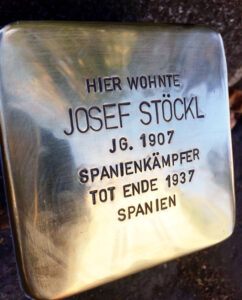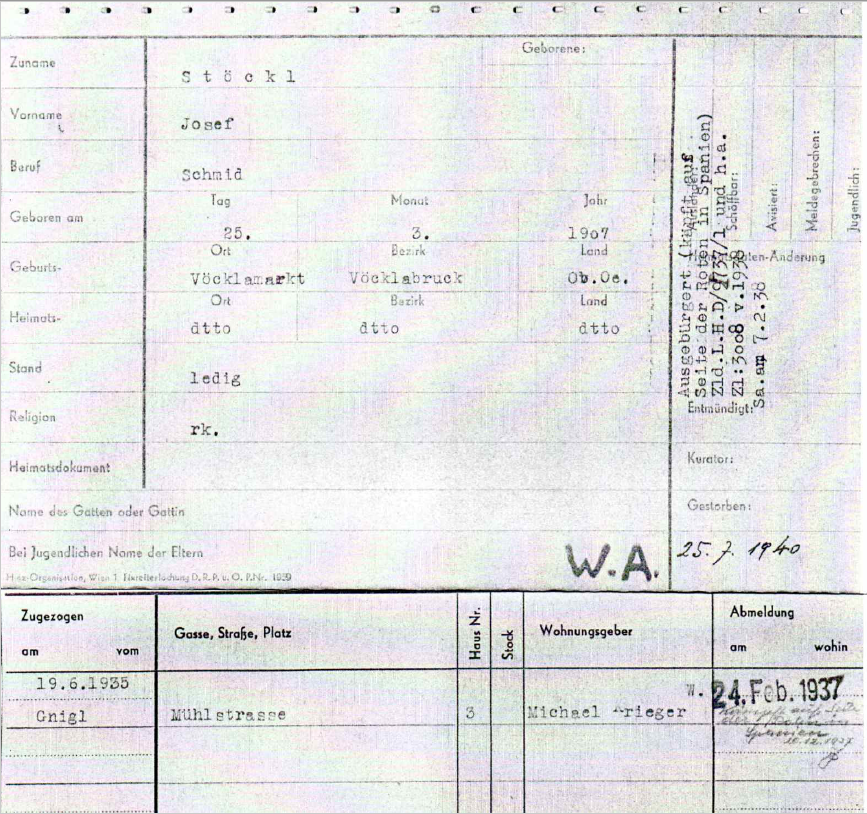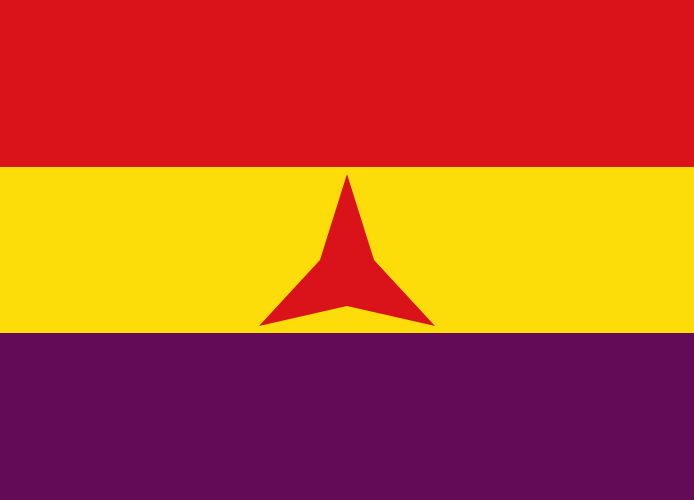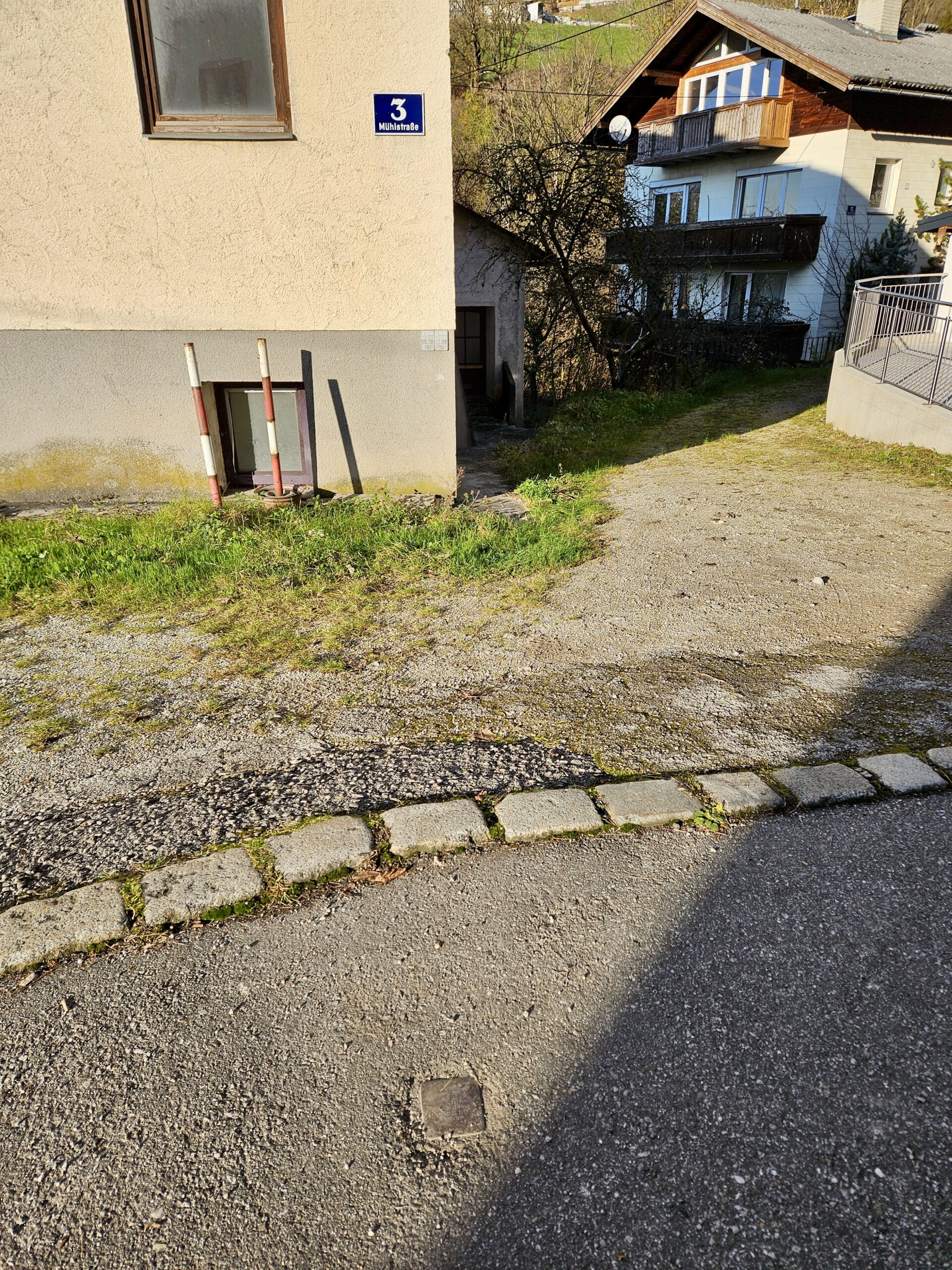Josef STÖCKL was born in Vöcklamarkt (a small community in the Vöcklabruck district of Upper Austria) on March 25, 1907 and was baptized into the Catholic Church.
He was the son of an unmarried servant named Franziska Stöckl. Young Josef was trained as a smith and when he finished his training and turned 21 in 1928 he moved to the then independent community of Gnigl (which was annexed to the city of Salzburg in 1935).
He was registered there as a laborer and because of the world economic crisis that set in soon after his arrival he changed both employers and his address frequently over the course of the 1930s – sometimes living in so-called refugee barracks and finally as a sub-tenant at 3 Mühlstraße.
But his political opinions attracted the attention of the authorities under the Austrian dictatorship from 1933 to 1938.
At the start of 1936 the undercover gendarme Johann Lackner1 infiltrated the Salzburg state branch of the Austrian Communist Party (KPÖ), which had been illegal since 1933.
This enabled the state gendarmerie to identify the members of the organized resistance and to arrest 70 of its activists, including Johann BRANDTHALER, Hubert RANZENBERGER and Josef STÖCKL.
When they were freed after serving their sentences they saw no viable future for their opposition in Austria and sought more fertile fields for their activism elsewhere, especially in the ranks of the International Brigades that fought for the Spanish Republic in the Spanish Civil War from 1936 to 1939.
We know that in February 1937 Josef STÖCKL traveled via Paris to Spain – presumably with some of his comrades. He received military training at the headquarters of the International Brigades and was then assigned to the 14th anti-aircraft battery of the 86th Brigade.
But his participation in the fight against the Franco-Fascists didn’t last long: at the end of 1937 the 30 year old was killed by an air attack on the Spanish southern front – an attack by either the German Condor Legion or the Italian Aviazione Legionaria, both of which provided air support for the Franco forces and we don’t know which was responsible for his death or just where it occurred.
All we know is that Josef STÖCKL’s grave lies in Spanish earth.
His death was not noted in the Salzburg police registration files, just a note dated February 7, 1938 reporting his loss of citizenship on political grounds »fighting on the side of the Reds in Spain«.
In contrast the Vienna memorial for fallen Austrian fighters in Spain erected in 1988 says »For the freedom of Spain and Austria«.
What was not noted in 1988, however, was that Austria had never revoked the Austro-fascists’ cancellation of Josef STÖCKL’s citizenship.
The lives of his comrades Johann BRANDTHALER and Hubert RANZENBERGER who had survived the Spanish Civil War ended instead in the concentration camps of Nazi Germany.
But for decades the final fates of two Jews whose political activities were also uncovered by the Austro-fascist authorities in Salzburg remained unknown: Josefine SCHNEIDER and Hermann RUBENKES who were both gassed at Bernburg an der Saale in 1942 – for a long time they were forgotten victims in anti-fascist circles.
1 Johann (Hans) Lackner, the undercover Gendarme who infiltrated the Communist resistance against the Austro-fascist dictatorship, was highly praised in a Security Directorate report on September 1, 1936 and he was also active in uncovering the anti-government activities of the then illegal Nazi Party – which led to his imprisonment in the Dachau and Buchenwald concentration camps from 1938 to 1943.
On the orders of the Berlin Gestapo headquarters he was released on February 1, 1943 and sent back to Salzburg where he served as »camp leader« for forced laborers in the Nazi’s Oberascher arms factory just north of Salzburg in Kasern (see the August 20, 1943 executions of forced laborers including Alexander DUBINA).
Lackner survived the liberation, completed his law studies and became the head of the Salzburg state police. As someone who had been politically persecuted by the Nazi regime Dr. Hans Lackner became a member of the board of directors of the Salzburg State Association of Austrian Concentration Camp Prisoners and Other Politically – which was known as the KZ-Verband (Concentration Camp Association).
During the Cold War the KZ-Verband was under observation by the state police because it was dominated by members of the Austrian Communist Party and Lackner may once again have played the role of police spy.
Quellen
- Salzburg city and state archives
- Salzburg Security Directorate
- Widerstand und Verfolgung in Salzburg 1934-1945, Volume I, Vienna and Salzburg 1991, pages 113-123
- Lexikon der österreichischen Spanienkämpfer 1936-1939, published by Hans Landauer in cooperation with Erich Hackl, Vienna 2008, page 216
Translation: Stan Nadel
Stumbling Stone
Laid 26.09.2018 at Salzburg, Mühlstraße 3

 Police Registration Card for Josef Stöckl noting his loss of citizenship for »fighting on the side of the Reds in Spain«.
Police Registration Card for Josef Stöckl noting his loss of citizenship for »fighting on the side of the Reds in Spain«.
 Flag of the International Brigades
Flag of the International Brigades
 Memorial for the Austrians who fought for the Spanish Republic, Vienna 1988, Central Cemetery
Memorial for the Austrians who fought for the Spanish Republic, Vienna 1988, Central CemeterySource: www.nachkriegsjustiz.at
 Photo: Gert Kerschbaumer
Photo: Gert Kerschbaumer
